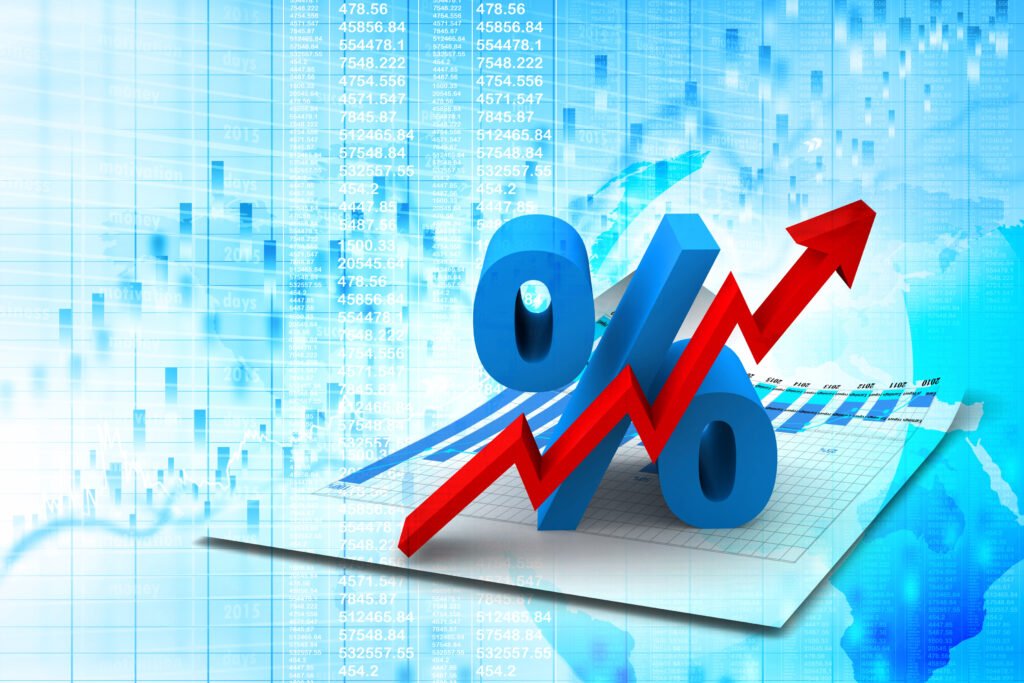By Luis P. Lopez, Equity Analyst
During the early days of the coronavirus pandemic, markets faced a lot of turbulence, with stocks and other assets selling off hard. To calm markets and ensure the smooth functioning of the financial system, the Federal Reserve cut interest rates to near-zero while the federal government printed trillions of dollars in fiscal stimulus.
The Federal Reserve’s massive stimulation worked. The American populace was spared a second Great Depression, and stocks stabilized and soon started to rise. However, soon after the pandemic began to wane, the rebound in demand started causing inflation.
The inflation rate in the United States accelerated to a 40-year high at 7.5% in January, with experts predicting at least six hikes during 2022 to curb inflationary pressures. The Fed aims to control the rising inflation by hiking interest rates. Banks have historically been sensitive to inflation. But with the interest rates hike on the horizon, will the banking sector benefit from them? In this article, we will particularly discuss Bank of America (NYSE: BAC), JPMorgan Chase (NYSE: JPM), Citigroup (NYSE: C), and Wells Fargo (NYSE: WFC) and determine how they will fare in the backdrop of rising-interest rates.
Bank of America (BAC)
The Bank of America is one of the top candidates in the banking sector that can benefit from the rising interest rate environment. If the Federal Reserve hikes interest rates, the lending rates offered by the banks would rise as well, which is a favorable scenario for most banks. However, the deposit mix of Bank of America consists of a higher proportion of non-interest-bearing deposits, which puts the bank in an advantageous position to benefit from rising rates. The bank estimates that a 1% rise in yield curve would earn the bank an additional $7.2 billion in net interest income per year. With the cash flowing in, BAC could easily raise its dividend, currently yielding around 1.8%.
With the current wave of inflation, consumers would not only have to pay high-interest charges but also have to borrow more due to higher prices of items they want to fund using borrowed money.
JPMorgan Chase (JPM)
The interest rate hikes in 2022 would result in higher net interest income for JPMorgan Chase as well. The bank’s NII from loans was around $44.5 billion in 2021, which is expected to rise to $50 billion with the expected interest rate hikes and loan growth in 2021. However, some of the increase in the NII could be offset by the decline in fixed-income-related net interest income from the bank’s corporate & investment banking (CIB) markets division as the cost of funding fixed-income assets rises as well.
Citigroup ( C)
Like other banks, Citigroup is also likely to benefit from possible interest rate hikes by the Federal Reserve in 2022. The net interest income (NII) of the bank in Q4 2021 was $10.82 billion, which was flat from the year-ago period. The net interest margin (the difference between the interest rate paid and the interest rate earned) also declined to 1.98% in Q4 2021 compared with 2.06% in Q4 2020. With the expected hike in interest rates, the net interest margin is likely to increase. This could mean that Citi’s already juicy 3% yield could rise over the next few years.
Wells Fargo (WFC)
Wells Fargo has high-interest rate sensitivity as determined by its net interest margin of 2.11% in Q4 2021. So, high-interest rates have the potential to increase its revenues and profitability. The bank estimates that an increase of just 0.5% in short-term interest rates would increase net interest income by around $2.7 billion over the next year. However, the amount of net interest income the bank earns in 2022 will depend on a variety of factors, such as absolute level of interest rates, loan demand, the shape of the yield curve, among others.
Conclusion
After analyzing the impact of the possible interest rate hike on the prominent banks in the banking sector, we found out that all of the banks would benefit from interest rate hikes. However, some banks are more sensitive to interest rates and are better positioned than others due to their business dynamics and deposit mix. For example, Bank of America has a high concentration of non-interest bearing deposits in its deposit mix, which allows it to get the most of high-interest rates. Due to the presence of non-interest-bearing deposits, the bank does not have to pay interest on these deposits, which will increase its net interest margin. Bank of America is also a long time favorite of tycoon Warren Buffett, and he is one of the bank’s largest shareholders.
JPMorgan Chase can also benefit from high-interest rates, but the impact might be limited because of the offsetting impact of the bank’s Commercial/Investment Banking division. Investment banking prints money when interest rates are low and the stock market is booming. With interest rates rising, and stocks wobbling, the CIB division could struggle.
Citigroup and Wells Fargo both have approximately similar net interest margins, and similar current dividend yields (around 3%). Based on our analysis of interest rates and inflation, Bank of America is slated to get the highest benefit from possible interest rate hikes by the Federal Reserve, followed by JPMorgan Chase, and Wells Fargo. Even though Bank of America doesn’t currently offer the highest dividend yield, it may offer the greatest growth going forward.



More Stories
ABBOTT LABS: REAPING THE DIVIDENDS OF AN AGING PLANET
ALPHABET, INC: A DIVIDEND STAR IS BORN?
MCDONALD’S: SERVING UP TASTY DIVIDEND PROSPECTS